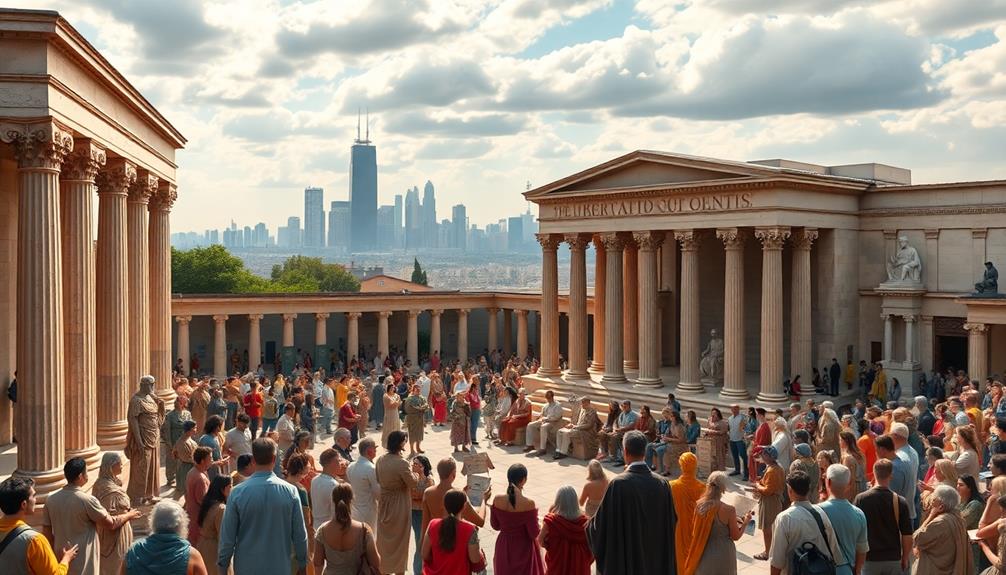Ancient Greeks shaped your political systems through key principles of democracy and civic engagement. They introduced concepts like the rule of law and written constitutions, which still guide modern governance. Their ideas on voting rights evolved over time, paving the way for inclusive participation today. The structure of government they established, emphasizing separation of powers, prevents any single group from dominating. Athenian democracy also promoted civic responsibility, urging citizens to be active participants. Overall, ancient Greek ideals underpin many democratic values you recognize now. To explore more influences and their lasting impact, keep going to uncover the details!
Key Takeaways
- Ancient Greece established the foundations of democracy, influencing modern political systems with concepts of citizen participation and civic responsibility.
- The principles of written constitutions from ancient Greece shaped contemporary governance, ensuring laws are clear and accessible.
- Aristotle's philosophy on natural law and accountability laid the groundwork for modern legal systems, emphasizing the rule of law for all citizens.
- Athenian direct democracy inspired current representative systems, highlighting the importance of citizen engagement and informed electorates.
- The separation of powers introduced by ancient Greek governance prevents the concentration of power, promoting checks and balances in modern democracies.
Historical Foundations of Democracy

Drawing inspiration from ancient Greek city-states, particularly Athens, modern democracies have their roots firmly planted in the past. Athenian democracy allowed male citizens to actively participate in decision-making, shaping the foundation of citizen engagement you see today. This early model emphasized civic responsibility, reminding you that democracy isn't just a system—it's a way of life where each citizen plays a significant role.
Aristotle's concept of natural law and the rule of law further influenced the development of modern legal systems. He argued that laws should be publicly known, equally enforced, and impartially judged, principles that remain essential for you as a citizen today. The U.S. Constitution, inspired by ancient Greek written constitutions, serves as the supreme law of the land, aiming to standardize governance and protect individual rights.
However, it's important to recognize the limitations of Athenian democracy, such as the exclusion of women and slaves from political participation. This aspect parallels ongoing discussions about voting rights and inclusivity in contemporary democratic systems.
Understanding these historical foundations equips you to better appreciate and engage in the democratic processes that shape your life.
Principles of Civic Participation

When you think about civic participation, the ancient Greeks set a powerful example with their direct democracy practices.
They viewed civic responsibility as a duty, encouraging every citizen to engage in decision-making for their community.
This emphasis on active involvement shapes how we comprehend participation in today's political systems.
Direct Democracy Practices
In ancient Athens, citizens actively engaged in direct democracy, shaping their governance through participation in assemblies where they voted on laws and policies. This model of direct democracy emphasized civic participation, as male citizens gathered in large numbers—often 5,000 to 6,000—demonstrating the importance of public involvement in decision-making. Each citizen's voice counted, ensuring that governance reflected the community's needs.
Civic engagement wasn't just a right; it was viewed as a responsibility. Active participation in political life was essential for the health and well-being of society. To foster this involvement, Athens used a lottery system to assign civic duties, emphasizing that every citizen should contribute to governance rather than relying solely on elected officials. This approach reinforced the principles of personal accountability and responsibility.
Today, these Athenian practices continue to influence modern democratic systems. The emphasis on direct democracy inspires current movements advocating for greater civic participation, urging you to take an active role in shaping your community.
Civic Responsibility Emphasis
Civic responsibility forms the backbone of a healthy democracy, urging citizens to actively participate in shaping their communities. In ancient Greece, particularly in Athens, this principle was deeply ingrained in the fabric of society. Citizens were expected to engage directly in political life, with assembly meetings where thousands gathered to vote on pressing issues. This level of active citizen involvement highlighted the importance of each individual's voice in democratic governance.
The Greeks understood that civic responsibility wasn't just about participation; it was also about preparation. They emphasized education, ensuring citizens were well-versed in rhetoric and logic. This knowledge empowered individuals to make informed decisions and engage in meaningful political discussions.
Additionally, the lottery system for assigning civic duties fostered a sense of shared responsibility among citizens, reinforcing the idea that governance is a collective endeavor.
Today, the emphasis on civic responsibility remains essential. Modern democracies thrive when citizens recognize their role in shaping policies and advocating for their communities. By understanding the legacy of ancient Greece, you can appreciate the importance of staying informed and actively participating in democratic processes, ensuring a vibrant and responsive governance system for all.
Evolution of Voting Rights

When you look at the history of voting rights, you'll notice how both ancient Athens and early U.S. democracy started with significant restrictions.
Only free male citizens were allowed to vote in Athens, much like how early American voting was limited to white landowners.
As time went on, both societies gradually expanded voting rights, highlighting a shared journey toward greater inclusivity.
Historical Voting Restrictions
Throughout history, voting rights have faced numerous hurdles, reflecting societal values and power dynamics. In ancient Greek democracy, particularly in Athens, voting was exclusively reserved for male citizens over 18, effectively disenfranchising women, slaves, and non-citizens. This practice set a precedent that echoed through time, especially in the early United States, where voting rights mirrored Athenian limitations. Initially, suffrage was granted mainly to white, landowning men, systematically excluding women and people of color from the electoral process.
The passage of the 15th Amendment in 1870 aimed to eliminate racial discrimination in voting, allowing African American men to participate. However, barriers like literacy tests and poll taxes continued to disenfranchise many individuals, undermining the spirit of democracy.
It wasn't until the Voting Rights Act of 1965 that significant strides were made in prohibiting racial discrimination, ensuring all citizens could vote in elections.
Today, the evolution of voting rights remains a hot topic, with ongoing debates surrounding voter ID laws and access to polling places. These discussions are a reminder of the historical struggles that shaped our current democratic landscape and the need for continued vigilance in protecting voting rights.
Expansion of Voting Rights
Many people may not realize how far the expansion of voting rights has come since its inception in ancient democracies. In ancient Greek democracy, only male citizens could participate, a practice that mirrored early U.S. voting restrictions. However, significant progress has occurred over time.
| Key Milestones | Description |
|---|---|
| 15th Amendment (1870) | Prohibited voting discrimination based on race |
| 19th Amendment (1920) | Granted women the right to vote |
| Voting Rights Act (1965) | Prohibited racial discrimination in voting |
The gradual shift toward inclusivity reflects the core principles of equality and participation rooted in ancient Greek governance. Just as Athens used a lottery system to engage citizens, modern democracies continuously explore methods to enhance civic involvement.
Today, the ongoing struggle for voting rights—addressing issues like disenfranchisement due to felony convictions—shows how far we've come and the challenges that still exist. By examining these historical parallels, you can appreciate the evolution of voting rights from ancient times to today, reaffirming the importance of participation in a democratic society.
Structure of Government

In ancient Greece, particularly within the city-state of Athens, the structure of government laid the groundwork for modern democratic systems. You can see how this ancient Greek democracy set the stage for contemporary governance through several key elements:
- Direct Participation: Citizens actively took part in decision-making processes, voting on laws and policies during assemblies.
- Written Constitution: The introduction of written constitutions established a clear framework for governance, inspiring modern documents like the U.S. Constitution.
- Trial by Jury: The use of juries in legal disputes guaranteed that citizens had a role in the judicial process, reinforcing the principle of the rule of law.
Athenian democracy also emphasized the separation of powers, distributing governance among various bodies.
This principle influences today's political systems, advocating for checks and balances that prevent the abuse of power.
Furthermore, the notion of civic duty, where citizens are expected to engage in political life, continues to resonate in modern democracies.
Influence of Greek Philosophy
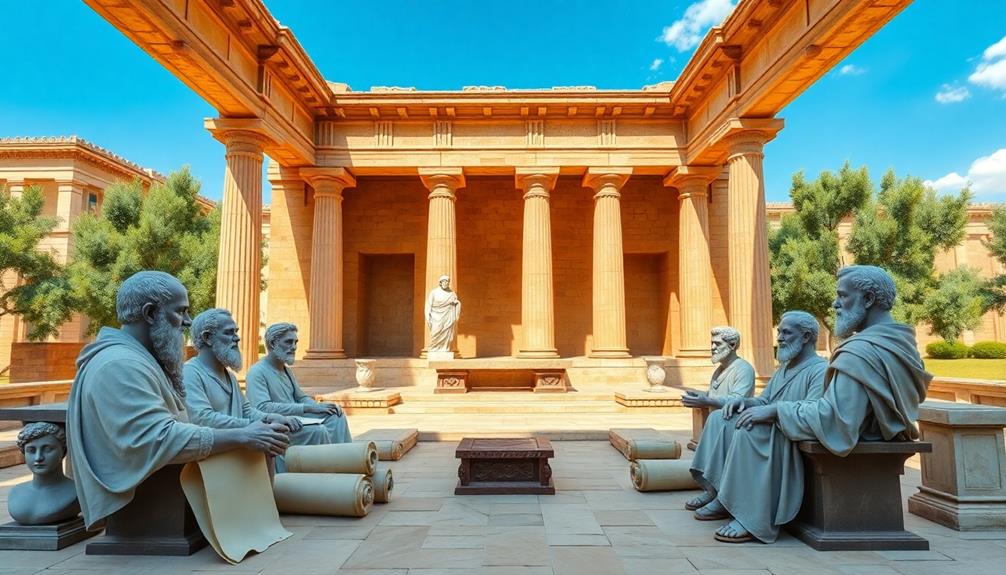
Ancient Greek philosophy profoundly shapes modern political thought and systems, offering crucial insights into governance, ethics, and justice. Philosophers like Plato and Aristotle laid the groundwork for your understanding of democracy and citizenship today. Aristotle's emphasis on natural law and constitutions directly influences contemporary democratic principles, while the Socratic method fosters critical thinking and dialogue in political discourse.
Here's a breakdown of key philosophical contributions:
| Philosopher | Contribution |
|---|---|
| Plato | Concept of ideal governance |
| Aristotle | Natural law and constitutionalism |
| Socrates | Socratic method for dialogue |
These philosophical discussions encourage active participation in governance, which is essential for a functioning democracy. The Greeks' ideas about the balance of power and the role of the state continue to shape debates on government authority and civil rights. By engaging with these foundational concepts, you can better appreciate how ancient thought informs your participation in modern democratic systems and the importance of civic duty in today's society.
Role of Citizenship
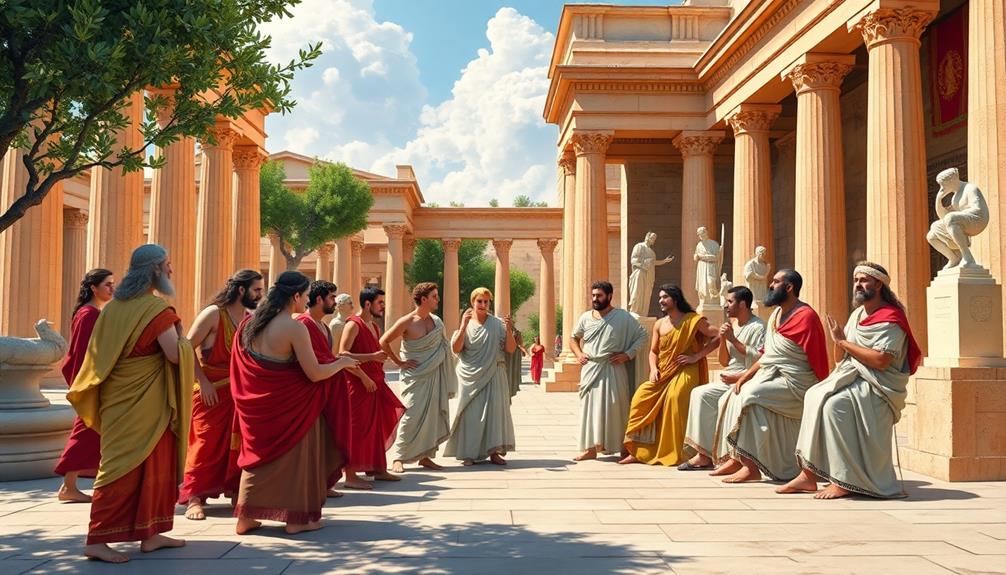
The influence of Greek philosophy on the concept of citizenship remains significant in today's political landscape. Ancient Greece established early notions of who could participate in governance, which still shape modern definitions of citizenship.
Here are three key aspects of this influence:
- Active Participation: Athenian citizens were expected to engage in civic duties, underscoring the importance of active involvement in democratic processes.
- Civic Responsibility: The Greeks emphasized that citizens should be educated and informed, a principle that resonates in today's calls for civic education and public awareness.
- Direct Democracy: Ancient city-states utilized assemblies where citizens voted on laws, laying the groundwork for the direct democracy we see in some modern political systems.
However, it's essential to acknowledge that citizenship in ancient Greece was limited, excluding women and slaves.
This historical context serves as a reminder of the ongoing struggles for inclusive political participation in today's democratic frameworks.
As you reflect on your role as a citizen, remember that active engagement and understanding of civic responsibility are fundamental for maintaining a healthy democracy.
Accountability and Rule of Law

Accountability and the rule of law form the backbone of a functioning democracy, ensuring that everyone, including leaders, is held to the same standards. Ancient Greek philosophers, especially Aristotle, laid the groundwork for these concepts, establishing natural law that promotes equal and fair application of laws.
In Athens, public officials were required to be accountable for their actions, fostering a culture of transparency that modern democracies aim for today. The Athenian model emphasized that no citizen, regardless of status, was above the law. This principle reinforces the idea that the rule of law should apply universally, preventing abuses of power.
When you engage in civic activities, you uphold this crucial democratic value, reminding leaders that they must answer for their decisions.
Furthermore, the Greeks pioneered the use of written laws, influencing the development of constitutions like the U.S. Constitution, which outlines citizens' rights and government limitations.
Written Constitutions and Governance
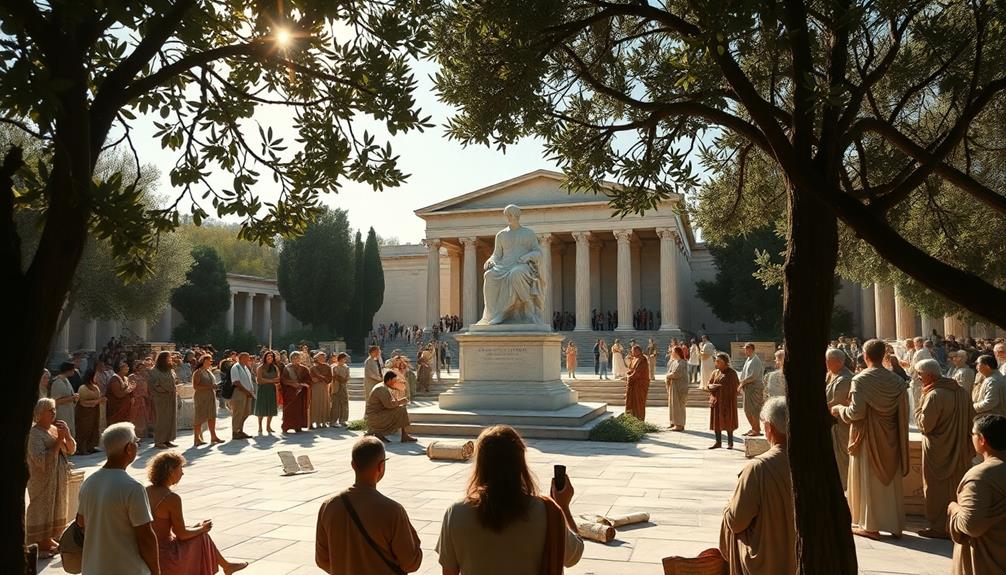
When you look at the development of constitutional frameworks, you'll see how ancient Greece shaped the principles we rely on today.
Their emphasis on accountability and the separation of powers created a solid foundation for modern governance.
Constitutional Framework Development
Throughout history, written constitutions have played an essential role in shaping governance and guaranteeing that laws are consistently applied. The concept of a constitutional framework, influenced heavily by ancient Greece, established a foundation for modern legal systems. This influence is echoed in various aspects of governance, including elements of fixing technical SEO errors that guarantee transparency and accountability in legal practices.
Here are three key contributions from ancient Greek governance:
- Standardization of Laws: Ancient Greeks utilized written constitutions to standardize governance, guaranteeing that laws were clear and publicly accessible.
- Emphasis on the Rule of Law: These early constitutions underscored the importance of the rule of law, promoting fairness and equality in the application of laws.
- Influence on Modern Democracies: The principles outlined in Greek constitutions provided a model that many modern democracies, including the U.S., follow today.
The U.S. Constitution, inspired by Greek concepts, serves as the supreme law, outlining the structure of government and protecting individual rights.
Aristotle's writings further influenced this development, highlighting the necessity of governance based on written laws.
Today, the legacy of these ancient frameworks guarantees that laws aren't only established but also upheld, forming the backbone of contemporary governance and legal practices.
Principles of Accountability
The principles of accountability in governance have roots that trace back to ancient Greece, where written constitutions laid the groundwork for responsible leadership. These constitutions standardized governance, outlining the rights and responsibilities of both citizens and officials.
You can see this influence clearly in the U.S. Constitution, which serves as the supreme law and establishes a framework for justice and accountability in governance.
Aristotle's writings emphasized the rule of law, a concept that guarantees laws are public, enforced equally, and subjected to independent judgment. This principle remains a cornerstone of modern democratic systems, reinforcing the notion that no one is above the law.
The practice of trial by jury, also rooted in ancient Greek democracy, promotes accountability by allowing you, as a citizen, to participate directly in the judicial process. This means you can hold government officials accountable for their actions.
Greek democratic ideals stress the importance of civic responsibility and active participation in governance. These principles continue to shape contemporary democratic practices, guaranteeing that accountability remains a central expectation in today's political systems.
Separation of Powers
Accountability in governance naturally leads us to contemplate the separation of powers, a concept deeply rooted in ancient Greek political models. This principle divides government responsibilities into distinct branches to prevent any one group from gaining too much control.
The Greeks laid the groundwork for modern systems that prioritize accountability through structured frameworks. Here are three key aspects of the separation of powers:
- Checks and Balances: Ancient Greeks emphasized mechanisms that guarantee no single branch dominates the others, fostering a balanced governance model.
- Written Constitutions: They utilized written constitutions to formalize rules, providing clear guidelines for government structure and operations, which greatly influenced documents like the U.S. Constitution.
- Civic Engagement: The Athenian practice of assemblies encouraged citizen participation, reinforcing the idea that government must be answerable to the people.
These foundational elements demonstrate how ancient Greek thought shaped today's political systems, guaranteeing that accountability and transparency remain central to governance.
Direct vs. Representative Democracy

Often, people find themselves debating the merits of direct versus representative democracy. In ancient Athens, direct democracy allowed eligible male citizens to vote directly on legislation and executive decisions. This model emphasized active citizen engagement, as assemblies could consist of 5,000 to 6,000 participants discussing and voting on key issues.
You can see how this close involvement fosters a strong sense of community and accountability among citizens.
In contrast, today's representative democracy, like that practiced in the U.S., involves citizens electing officials to make decisions on their behalf. This system addresses the practical challenges of governance in larger populations, where direct participation by all citizens might be unfeasible.
While you might appreciate the immediacy of direct democracy, you must also consider the benefits of having elected representatives who can dedicate time and expertise to complex issues.
Ultimately, both systems aim to engage citizens in governance, albeit in different ways. Understanding these differences can enrich your perspective on how political systems evolve, reflecting society's needs and values over time.
Legacy of Ancient Greek Ideals
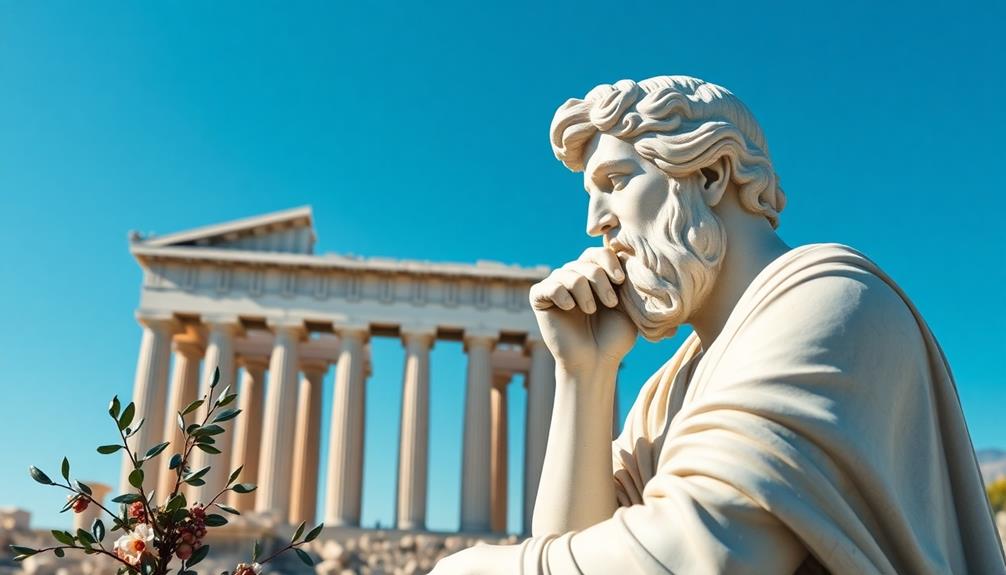
Ancient Greek ideals have profoundly shaped modern political thought, with their influence evident in today's democratic systems. The concepts they introduced continue to resonate, establishing a framework for governance that emphasizes citizen involvement. Here are three key legacies:
- Democracy: Ancient Greeks pioneered direct democracy, where citizens actively voted on key issues, a principle that still underpins modern representative democracies.
- Citizen Participation: The idea that every citizen should engage in governance promotes an informed electorate, ensuring that everyone has a voice in decision-making processes.
- Rule of Law: Rooted in Aristotle's natural law, this principle insists that laws apply equally to all, a cornerstone of today's legal frameworks.
Moreover, the Greeks emphasized civic education and public discourse, reinforcing the importance of an informed citizenry in sustaining democracy.
Their commitment to values like freedom of speech and civic responsibility continues to influence contemporary discussions on human rights and governmental accountability.
Frequently Asked Questions
How Did Ancient Greek Politics Influence the Modern World?
Ancient Greek politics shaped your world by introducing democracy and civic engagement. Their emphasis on rule of law and written constitutions laid foundations for modern governance, inspiring you to value participation, representation, and accountability in political systems today.
How Have the Ancient Greeks Influenced the World Today?
Think of a vibrant agora, where citizens passionately debate ideas. You see echoes of that in today's society, where civic engagement and democratic principles thrive, reminding you how ancient Greeks continue to shape our world.
What Are the Influences From Ancient Greece on the US Government?
You'll find that the U.S. government incorporates ancient Greek ideas like democracy, separation of powers, and natural law. These principles promote citizen participation, accountability, and prevent any single authority from becoming too powerful.
How the Political Structures of Ancient Greece Changed Over Time?
Oh sure, ancient Greeks just threw out kings and said, "Let's all vote!" They went from monarchies to democracy, mixing things up with assemblies and lotteries, proving that even politics can play a game of chance!
Conclusion
In sum, the stunning significance of ancient Greek ideals still shapes our modern political landscape. Their groundbreaking governance, passionate participation, and philosophical foundations forge a framework that fuels democracy today. By embracing the echoes of their enduring influence, we can cultivate a more conscious civic community. So, let's celebrate the timeless teachings of the ancients and endeavor to strengthen our systems, ensuring that the spirit of democracy continues to thrive for generations to come!
